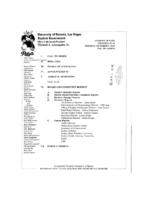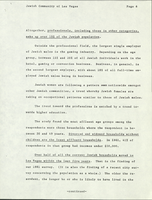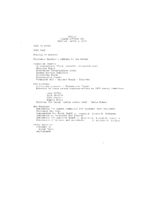Search the Special Collections and Archives Portal
Search Results

Transcript of interview with Don Laughlin by Stefani Evans and Claytee White, October 10, 2016
Date
Archival Collection
Description
Minnesotan Don Laughlin landed far from the land of (more than) 10,000 lakes. His office 90 miles south of Las Vegas in the eponymous town of Laughlin commands an unimpeded view of a very different landscape from that of his youth. Here, where the Colorado River flows south through one of its narrowest channels, Laughlin arrived in about 1966 and purchased what would become the Riverside Resort Hotel and Casino. The endeavor was so successful that the then-settlement of 10 to 15 people at that tiny spot on the river grew to be an unincorporated town housing more than 7,000 people in 2010. Today, Laughlin the man continues to promote and support Laughlin the town via flood control projects and infrastructure development. In this interview, Laughlin sits amid the antique slot machines in his office and enjoys the view as he recalls his childhood on the family farm in southern Minnesota, and talks about leaving the farm in the late 1940s for nearby Owatonna to do watchmaking and watch repairing while simultaneously running a slot machine and pinball parlor. After visiting Las Vegas on vacation, he arrived permanently in 1952 and bartended at the Thunderbird Hotel until he bought his own bar and restaurant in Downtown Las Vegas, which he named Laughlin’s Made Right Café. After selling the café, he bought the 101 Club in North Las Vegas. He began searching for a casino for a casino to buy, seeking only those located on the border of a state that did not allow gambling. When he found the small hotel/casino on the Colorado River he purchased it. He talks of building an airstrip across the street and making daily trips to Las Vegas to buy groceries, beer, and toilet paper-essentially, everything one would need to run a hotel, restaurant, and casino-sometimes making three trips in one day. He continues to own and manage his hotel/casino at the age of 85, and he is in his office every day, all day, seven days a week. He gave up flying last year because he claims he’s too old to pilot his own aircraft. So is especially advantageous that the town that bears his name can now supply almost everything that he and the Riverside Resort Hotel and Casino need.
Text

Transcript of interview with Sonja Saltman by Barbara Tabach, August 18, 2015
Date
Archival Collection
Description
Included in this oral history are reminiscences of Sonja Saltman's personal non-Jewish heritage in Austria, the importance of her grandmother in her life, and how she recalls becoming part of the Jewish community.
Sonja Saltman is a psychologist and philanthropist in Las Vegas, Nevada. She is executive director and co-founder of the Existential Humanistic Institute, a non-profit organization based in San Francisco, California that offers training in existential-humanistic therapy and theory. In 2003 Sonja and her husband Michael Saltman founded the Saltman Center for Conflict Resolution at the University of Nevada, Las Vegas (UNLV) William S. Boyd School of Law. The Saltman Center is focused on research, teaching, and public service related to "the advanced study of the nature of conflict and how to resolve it." A native of Austria, Sonja Saltman also serves as the Honorary Consul for Austria in Las Vegas. The Saltmans are involved with multiple charitable organizations and initiatives, both locally and abroad. Sonja Saltman has served on the boards of the Anti-Defamation League, Nevada Women's Philanthropy, and the Black Mountain Institute. Projects that the couple has supported include the rebuilding of homes and bridges is Bosnia, and Streetball Hafla, a basketball program to improve relations between Jewish and Arab teenagers in Israel. In 2014 Sonja and Michael Saltman were recognized as Distinguished Nevadans by the Nevada System of Higher Education. Included in this oral history are reminiscences of her personal non-Jewish heritage in Austrian, the importance of her grandmother in her life, and how she recalls becoming part of the Jewish community.
Text

Transcript of interview with Alfred "Al" Isola by Stephen Kalish, March 15, 1976
Date
Archival Collection
Description
On March 15, 1976, Stephen Kalish interviewed Alfred “Al” Isola (born August 3rd, 1917 in Oakland, California) in his office about his garbage company and early Southern Nevada. The two discuss Las Vegas’ lack of a unified garbage system and how dumping sites have had to adjust their practices in order to limit their impact on pollution. Isola also explains the different disposal protocols for wet and dry trash. On the second tape of the interview, an unidentified woman enters the conversation.
Text

Transcript of interview with Clifford Kemple by Paul Wilkins, April 4, 1976
Date
Archival Collection
Description
On April 4, 1976, Paul Wilkins interviewed former miner Clifford Kemple (born September 28th, 1909 in Salt Lake City, Utah) in his home in Las Vegas, Nevada. The two discuss Kemple’s early life in Goodsprings, Nevada and Las Vegas, Nevada. Kemple also talks about changes that he has noticed in Las Vegas more broadly.
Text

Transcript of Interview with Merna Dennison by Ken Pyatt, March 1, 1980
Date
Archival Collection
Description
Text

Meeting minutes for Consolidated Student Senate, University of Nevada, Las Vegas, October 06, 2003
Date
Archival Collection
Description
Text

Article, The Jewish Community of Las Vegas by Jerry Countess, September 1987
Date
Archival Collection
Description
In this essay, Jerry Countess provides narrative context for a demographic study of the Jewish population in Las Vegas, and addresses the services and community needs revealed by the study and the growing Jewish population.
Text

Meeting minutes for Consolidated Student Senate, University of Nevada, Las Vegas, March 5, 1974
Date
Archival Collection
Description
Text

John Fudenberg oral history interview: transcripts
Date
Archival Collection
Description
Oral history interviews with John Fudenberg conducted by Barbara Tabach and Claytee D. White on May 3, 2018 and May 23, 2018 for the Remembering 1 October Oral History Project. In this interview, John Fudenberg, the coroner for Clark County in Las Vegas, Nevada, gives an account of his experience during the October 1, 2017 mass shooting on the Las Vegas Strip and what his role was during the tumultuous days after the shooting. He explains how he and the staff of the coroner's office prepared for the large number of casualties as well as their arrival at the Route 91 Harvest festival venue. Fudenberg speaks of setting up the Family Assistance Center at the convention center and how it supported the community but also aided the coroner's office in gathering information about the deceased and identifying them. Fudenberg discusses the main job of the Coroner's Office during the first week after the shooting, which was to autopsy the bodies and communicate with the families, as well as the Police Department. He also talks about the emotional impact the shooting and its aftermath had on him and his staff members and the wellness program they implemented, of which trauma yoga and meditation had a large impact.
Text

Martin Lopez Castillo oral history interview: transcript
Date
Archival Collection
Description
Oral history interview with Martin Lopez-Castillo conducted by Nathalie Martinez, Elsa Lopez, and Barbara Tabach on January 11, 2020 for the Latinx Voices of Southern Nevada Oral History Project. Martin Lopez Castillo was born in a small town in the State of Mexico. He immigrated to Phoenix, Arizona in the early '90s where he worked in construction and landscaping. Eventually, he made his way to Colorado where he began working as a cook. He moved to Las Vegas with his family in the early 2000s where he arrived in Las Vegas' Downtown. He worked in the mine by Primm, Nevada before becoming a gardener. His work has allowed him to see the changes that have happened in Southern Nevada, and he recounts the changes that have happened in Downtown Las Vegas since the 2008 recession. He is a self-taught English speaker and an avid chess collector. Subjects discussed include: Immigration, Chess, Landscaping, Teaching, and Downtown Las Vegas.
Text
